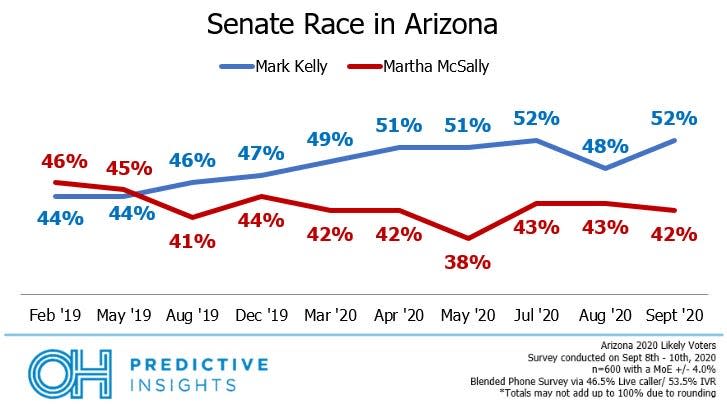Arizona Senate candidate Mark Kelly could take office early if he wins, putting him in place for a court vote
If Democrat Mark Kelly defeats incumbent Sen. Martha McSally in Arizona's high-stakes U.S. Senate race, he may not have to wait long to start work in Washington, D.C.
Two Republican and Democratic election attorneys agree that state law and Senate practices would make Kelly eligible to take over the seat once held by Sen. John McCain as soon as Nov. 30, when the state election results are expected to be canvassed.
If that happens, Kelly would help to narrow Republicans’ 53-47 majority in the chamber in a post-election, lame-duck session when the GOP could seek to confirm President Donald Trump’s nominee to succeed Justice Ruth Bader Ginsburg, who passed away Friday.
“Everything in statute suggests it happens very quickly after the election results are finalized,” Mary O’Grady, an attorney specializing in election law and a Democrat, said.
Who might succeed Justice Ginsburg? Trump's short list begins with these five women (and one man)
Thomas Basile, a Republican who also specializes in election law, added, "In the ordinary course, in an ordinary Senate election, the winner of the election would begin his or her term until January. But in this context, a special election to fill a vacancy in a pending term ... the winner could be sworn in and seated earlier than he or she otherwise would be if this were a regular election."
Barring litigation contesting the results of the election, state law requires the canvassing of election results on the fourth Monday after the election. This cycle, that would fall on Nov. 30.
Under this scenario, which is possible because McSally was appointed to the seat, Kelly would get another advantage. He would take office well before the crop of freshman senators are traditionally sworn in on at the opening of the new congressional session, which is typically in early January. That would give him a seniority advantage on several fronts, including the selection of committee assignments.
'Republicans ... need every vote'
Kelly’s presence wouldn’t upend the GOP majority before a new Congress is seated, but it has the potential to complicate things for Republicans, said Jessica Taylor, Senate editor for the nonpartisan Cook Political Report, which projects that the Arizona Senate race leans in Kelly's favor. Cook, along with Kaiser Family Foundation, released new polling Thursday that showed Kelly leading by 8 percentage points.
“Certainly there are things that a Republican-controlled Senate that has just lost their majority, with perhaps a lame-duck president, can try to push through in that final month, and that would be one less vote that they have,” she said. “And then if you have, you know, moderate defections … the Senate is still very close right now and Republicans still very much need every vote.”
The winner of the special election can begin his or her term of office after the Senate receives “credentials” from the state, and by taking the constitutionally-required oath of office in open Senate session, according to a 2010 report by the Congressional Research Service.
The Senate could also waive its long-standing rule requiring proper certification from a state via unanimous consent, the report said. The Senate has waived the rule on some rare occasions when, for example, there was an inadvertent delay of transmitting paperwork affirming a win.
More: McConnell says Senate will vote on Trump's nominee to fill Ruth Bader Ginsburg's Supreme Court seat

If the Senate isn't in session, there are other procedures that would allow the seating of senators-elect, said Don Ritchie, the Senate’s former historian.
“Usually, the Secretary of the Senate’s office goes out of its way to accommodate the new senators coming in,” he said. “The old senator is out of their office there. I mean, they actually literally put a lock on the door so their staff can’t go in. … Even if the Senate isn’t in session, there is a mechanism for swearing in a senator and taking care of things. … They don’t have to wait for the Senate to be formally in session.”
The Senate is in session until Oct. 9 and they are scheduled to return Nov. 9, after Election Day. After a one-week break for Thanksgiving, the Senate is scheduled to reconvene on Nov. 30, the same day Arizona’s election results would be canvassed.
The Senate is scheduled to work through Dec. 18.
Spokespeople for both Kelly and McSally's campaigns declined to comment.
Senate Leader Mitch McConnell has indicated he will remain focused on confirming conservative judges to federal courts, pushing his party to, in McConnell's words, “leave no vacancy behind.”
Controversial judicial appointments still outstanding
Controversial judicial appointments that could be considered include Toby Crouse, who was nominated months ago to serve on the U.S. District Court for the District of Kansas and Kathryn Kimball Mizelle, who the American Bar Association deemed “not qualified” to serve on the U.S. District Court for the Middle District of Florida.
“Kelly would make a difference: it would be 52-48 on any kind of nominee either to the executive branch or especially for judges,” said Carl Tobias, the Williams Chair in Law at the University of Richmond School of Law and who specializes in federal judicial selection.
“There likely will be some judicial nominees up, for sure. That makes it tighter and tougher, and Kelly being there, I think, would be important.”
There’s a financial element, as well, Basile and O’Grady said: once the election is decided, the senator-elect would begin drawing a salary.
This article originally appeared on Arizona Republic: Arizona U.S. Senate race could be a factor in Ginsburg's successor


